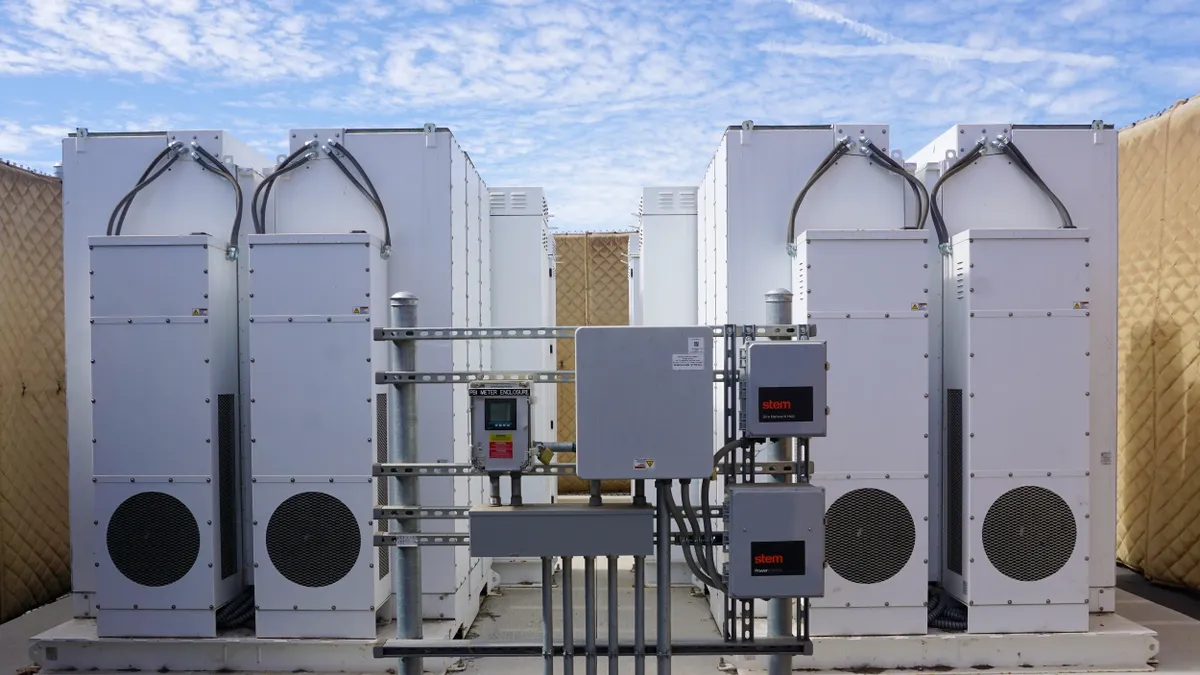Dive Brief:
- Gravity-based energy storage firm Energy Vault announced last week that it would go public through a merger with special purpose acquisition company (SPAC) Novus Capital Corporation II, the latest storage startup to try to capture a boom in the market.
- California-based Energy Vault, created at the tech incubator Idealab Studio, has developed a utility-scale storage system based on gravity and potential energy, storing energy in low-cost composite bricks and a mechanical crane system similar to an elevator. CEO Robert Piconi said on a call with investors that the SPAC merger would allow Energy Vault to accelerate distribution of a solution "uniquely positioned to address this market and global imperative toward the decarbonization of our planet."
- Additionally, Albany-based storage firm Key Capture Energy announced an acquisition by South Korea’s SK E&S Co., a subsidiary of conglomerate SK Group. The move continues SK E&S’ expansion in the U.S., following the acquisition of a California storage portfolio in 2019, an investment in Sunrun, and an investment in hydrogen company Plug Power.
Dive Insight:
The energy storage market continues to boom as utilities and businesses seek a solution to the intermittency issues posed by wind and solar generation. The Energy Information Administration predicted in August that large-scale battery storage installations could grow tenfold between 2019 and the end of 2023, with some 10,000 MW of new storage installed between 2021 and 2023. A June 2021 analysis from Wood Mackenzie forecasts that the U.S. storage market could be worth $8.5 billion a year by 2026.
Currently, the vast majority of the storage market is dominated by lithium-ion batteries, a cost-effective technology that also carries concerns about the supply chain and safety. Energy Vault has touted its gravity-based storage tools as a solution that gets around those issues, using only locally-sourced materials, including repurposing soil from the construction of its elevator storage tools. The company has a demonstration project in Switzerland and had previously announced an investment and demonstration project with Saudi Aramco Energy Ventures.
"It’s rare to see a confluence of having the right market growth conditions, the right product at the right time that solves an urgent global problem for our society and with significant demand on every continent and few economic and sustainable alternatives. That is until now," said Piconi on the investors’ call.
Key Capture, meanwhile, works on utility-scale storage and has a goal of deploying more than 1 GW of storage in New York, New England and Texas by the end of 2023. CEO and co-founder Jeff Bishop said the SK E&S acquisition will help the company accelerate those offerings, especially by offering more operational data about how to maximize the benefits of storage combined with renewable energy. Bishop added that the partnership will help improve the company’s work on big data and artificial intelligence on how storage can "optimize the wholesale market."
As the need for storage has grown, major investors have flooded into the market. Chevron Technology Ventures and Bill Gates’ Breakthrough Energy Ventures joined a more than $60 million fundraising round for long-duration storage firm Malta and FlexGen announced a $150 million equity commitment from Apollo Global Management. Reliance Industries Limited, the largest company in India, also joined a $144 million financing round for utility-scale battery firm Ambri.
Several other startups have joined Energy Vault in going public through a SPAC in the past year, including ESS, Stem and Eos Energy Storage.
The storage market remains dominated by just a handful of suppliers that are trusted for their business history and proof of technology. Analysts expect, however, that as more startups attract investment and big-name partnerships, the market could expand, especially with more renewables on the grid.
"We’re seeing a macro trend that legacy energy companies are recognizing they are in a declining industry and those that are heavy into fossil fuel generation have to pivot to be relevant," Bishop said. "People have historically underestimated how quickly wind and solar penetration would occur and in a similar way we are underestimating how quickly electrification will occur. There’s going to be a vast need for more wind, more solar and a lot more batteries."













